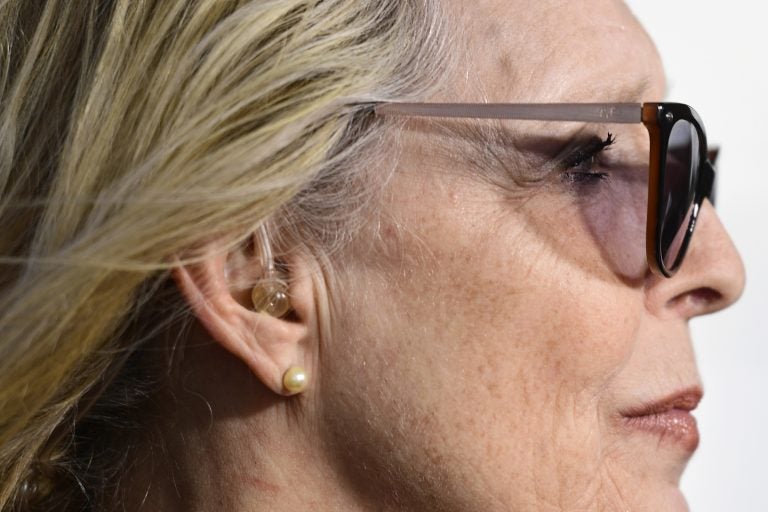Accusers, advocates: Cosby’s conviction is tipping point for the #MeToo movement
'Today, this jury has shown that what the #MeToo movement is saying is that women are worthy of being believed,' says Cosby accuser Lili Bernard.

Accuser Victoria Valentino prepares to speak to the media after Bill Cosby was found guilty of sexual assault at the Montgomery County Courthouse Thursday in Norristown, Pa. Valentino is a former Playboy playmate who accused Cosby of slipping her pills and raping her in the late 1960s. (Corey Perrine/AP Photo)
They called Andrea Constand a “pathological liar” and “con artist,” repeatedly questioning why she would dare visit a married man at his home.
They labeled Janice Dickinson “promiscuous,” scoffing: “It sounds as though she slept with every man on the planet.”
They jeered the words of the women — more than 60, by some counts — who have publicly accused Bill Cosby of drugging and sexually assaulting them over four decades, likening the growing chorus against him to “witch hunts, lynchings, (and) McCarthyism.”
But all the Cosby defense team’s insults couldn’t help the elderly entertainer dodge justice anymore. A Montgomery County jury Thursday declared the elderly entertainer guilty of drugging and sexually assaulting Andrea Constand, a former Temple University basketball official, in 2004 at his Cheltenham mansion. The stunning conviction came after just a day and a half of deliberations — and 10 months after another jury deadlocked in his first trial.
As they emerged from the courthouse sobbing with relief and embracing one another, his accusers couldn’t help but wonder: Is this a tipping point?
“We are vindicated, we are validated, and we are now part of the tsunami of women’s power and justice!” said Victoria Valentino, who attended both trials and has accused Cosby of drugging and raping her in 1969 in his Hollywood Hills home. “We are not shutting up, and we are not going away! Get over it!”
Beside her, fellow accuser Lili Bernard echoed that rage: “Today, this jury has shown that what the #MeToo movement is saying is that women are worthy of being believed … This is a victory for womanhood, and a victory for all sexual assault survivors!”
Supporters agreed that Cosby’s conviction could inspire authorities around the country to prosecute other men who, thanks to a victim-blaming and violence-excusing “rape culture,” have dodged justice.
“One of the juggernauts in the legal system are prosecutors who — even though they have a lot of evidence — are concerned about juries who are steeped in rape myths,” said Caroline Heldman, associate professor of politics at Occidental College in Los Angeles, who also attended both trials. “This sends a clear message to other prosecutors that even giants can be held accountable. Even icons can be held accountable.”
Heldman admitted that she was “pessimistic” that the jury would convict Cosby. “It only takes one person to hang a jury,” she said, adding that just a fraction of sexual assault suspects ever end up behind bars.
“The reality is defense attorneys always use rape myths as the backbone of their defense,” agreed Kristen Houser, a spokeswoman for the National Sexual Violence Resource Center. “It’s a tried-and-true way to cast doubt on the character and veracity of the victim, painting victims as liars, as schemers, as untrustworthy, all of those things. They use it regularly, because it often works.”
But Cosby’s conviction “signals a turning point,” Heldman said. “I really do think we’ve turned a corner as a culture.”
Ms. Foundation for Women President and CEO Teresa C. Younger agreed: “It is our hope that today’s verdict will be the first in a long line of decisions that hold powerful men responsible for the misogynistic and violent treatment of women that they have gotten away with for far too long.”
The prosecutors who tried Cosby — Kevin Steele, Kristen Feden, and M. Stewart Ryan — didn’t have “any of the things a jury likes to see,” such as forensic evidence, eyewitnesses or immediate reporting, Houser added.
“This decision gives hope that jurors are able to recognize when wrong is done, that they’re willing to convict even when it’s a powerful person, and maybe that the rape myths aren’t going to win all the time,” Houser said. “For me, that’s where I see the most hope. Despite (rape myths) being invoked very artfully by a top-notch defense team, that was not enough to obscure the view of the evidence, and to me, that’s very, very hopeful.”
Beyond persuading prosecutors to move such cases forward, advocates also expect the conviction will help them expand or altogether end statutes of limitations for sex assault. That’s how much time a victim has to report a crime — and some states give victims as little as a year to report a crime that already is among the most underreported crimes. Houser’s center estimates nearly two-thirds of sexual assaults are not reported to police.
Activists hope the conviction will change that statistic and encourage more victims to come forward.
“There’s a network of sister survivors,” Heldman said. “If you’re a survivor, you really are never alone. Your sister survivors are by your side.”
WHYY is your source for fact-based, in-depth journalism and information. As a nonprofit organization, we rely on financial support from readers like you. Please give today.




